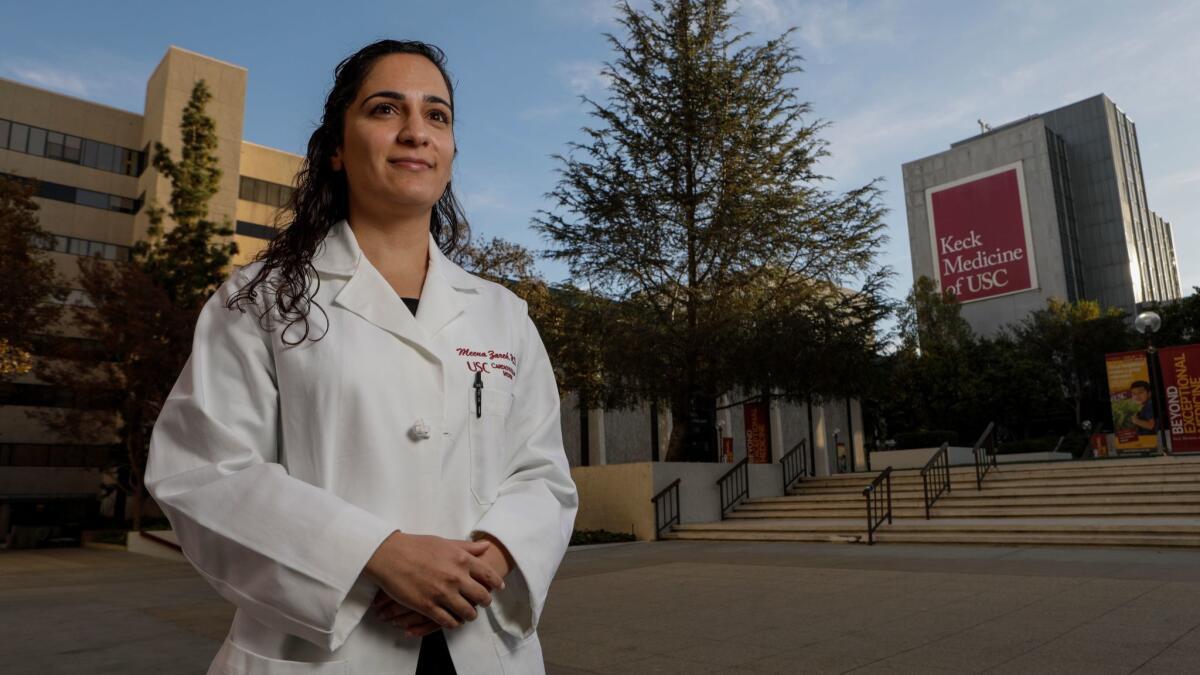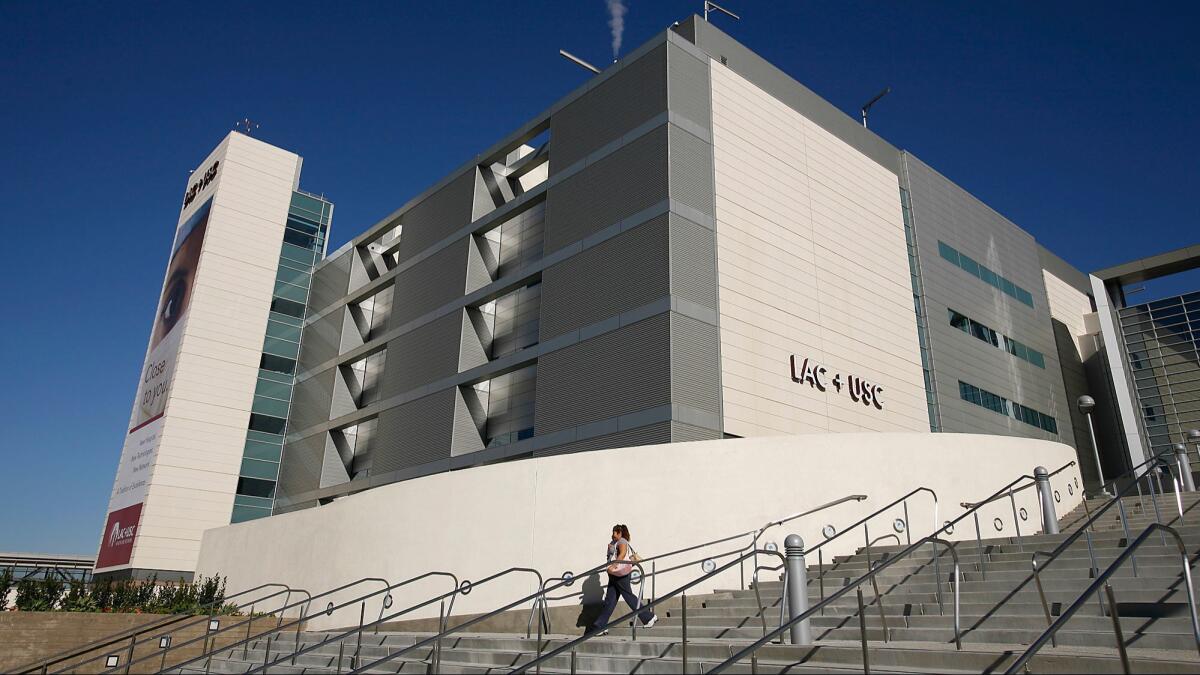Doctor at County-USC hospital says she was sexually assaulted by a fellow physician, prompting sheriff’s inquiry

- Share via
Allegations by a doctor at L.A. County-USC Medical Center that a fellow physician sexually assaulted her in the hospital have become the subject of a months-long criminal investigation.
Dr. Meena Zareh, a graduate of USC’s medical school who was then in a residency program at the hospital, told detectives that in 2015, a cardiovascular disease fellow cornered her in a windowless room, reached under her scrubs and violated her.
Shortly afterward, Zareh shared details about the alleged assault with friends and family, she asserted in a civil lawsuit, but did not report it to administrators in her residency program until three months later. In May, she made a report to the Sheriff’s Department about Dr. Guillermo A. Cortes, who denies any wrongdoing.
The case was presented in December to the Los Angeles County district attorney’s office, but prosecutors declined to file a felony charge of penetration by force. A deputy district attorney said the case lacked enough evidence “at this time,” according to a memo obtained by The Times.
Lt. Robert Peacock in the Sheriff’s Special Victims Bureau said Tuesday that detectives still have an “open and active investigation” into the incident and are also looking for “other potential victims.”
Zareh detailed the alleged sexual assault in a civil lawsuit she filed in 2016 against L.A. County and USC. In the lawsuit, Zareh alleges that Cortes assaulted her once, and that county and USC administrators mishandled her complaint once she came forward. She contends that county and USC administrators failed to properly investigate the incident and ultimately retaliated against her by pressuring her to delay her career and keep quiet.

Cortes, 34, declined to speak about the case and referred The Times to his attorney.
“Unfortunately we do not comment on active pending litigation matters beyond the fact that Dr. Cortes vehemently denies all of Dr. Zareh’s allegations,” the lawyer, Tomas Guterres, said in an email.
Zareh said the incident occurred the afternoon of Nov. 17, 2015, when Cortes summoned her to a private doctors’ call room on the hospital’s fourth floor to discuss a patient’s care.
When the discussion ended, she tried to leave, but he stood in the doorway and pushed her arms to her sides, she said. Cortes overpowered her, she alleged in the lawsuit.
Zareh added that she could still “recall the feeling of his fingernail scratching inside her.”
She told a co-worker about the incident that day, she said, and the co-worker later submitted to county investigators a sworn affidavit reviewed by The Times that supports Zareh’s account. The doctor said she feared telling police and her bosses, worrying that it could jeopardize her career prospects.
In an interview with The Times, Zareh, 33, said she hesitated to come forward but “ultimately it was too traumatic to ignore.”
About three months after the alleged assault, she said, she notified Dr. Eric Hsieh, a USC faculty member who ran the residency program. She wanted administrators to investigate her complaint and, at a minimum, Cortes to be assigned separate shifts.
A USC spokesman said Hsieh followed procedure by forwarding the complaint to the county. Although USC’s faculty helps run the 600-bed public hospital and the residency program, Cortes and Zareh were county employees.
The county said it took “immediate and appropriate actions” and referred the matter to human resources, prompting an inquiry, according to a statement from the county’s health department. Cortes was put on paid leave.
An investigation by county officials into the allegations followed, and Zareh’s attorney, Leslie Levy, said her client submitted an affidavit about what she experienced.
Before the county’s inquiry ended, officials sent Cortes a letter letting him know he could return to work in late May 2016. The letter barred him from unsupervised contact with Zareh. It’s unclear if Cortes faced any discipline.
Zareh said reprisals began after she came forward. She said one of her mentors dismissed the incident, saying, “You knew what you were doing.”
Zareh took a few weeks off and returned.
She said another supervisor suggested she take more time off or delay her fellowship, the next phase of her training, by working as an attending physician, according to court papers. He later floated the idea of her moving to programs outside California, and offered to make calls on her behalf, according to court papers.
She viewed any delay as a punishment and an effort by administrators to prioritize Cortes’ training over her own.
When Cortes returned to work in June 2016, Zareh said in court papers, she twice was scheduled to work alongside him.
She said she had repeatedly told administrators her fears of being attacked by Cortes.
Her schedules up until April of 2017 had sometimes listed him as her backup physician or working in the same space, she said in court papers. Encounters with him were sometimes unavoidable.
“Every time, I would say, ‘I don’t want to work with this guy. Keep him away from me,’” she said.
Zareh decided to file the civil lawsuit. A trial is scheduled for 2019.
In June, Cortes left the hospital. He began working in July as a resident physician at Ronald Reagan UCLA Medical Center.
A UCLA spokesman said the university learned about the allegations in late 2017, the same day a Times reporter inquired about the case. The spokesman said it followed proper procedures in hiring him and “had no knowledge of the alleged incident.” Administrators were “seeking to understand the facts” about the case, the spokesman added.
Zareh remains at the county hospital in Boyle Heights, where she is in the second year of a cardiology fellowship.
Twitter: @MattHjourno
Twitter: @sarahparvini
More to Read
Sign up for Essential California
The most important California stories and recommendations in your inbox every morning.
You may occasionally receive promotional content from the Los Angeles Times.












